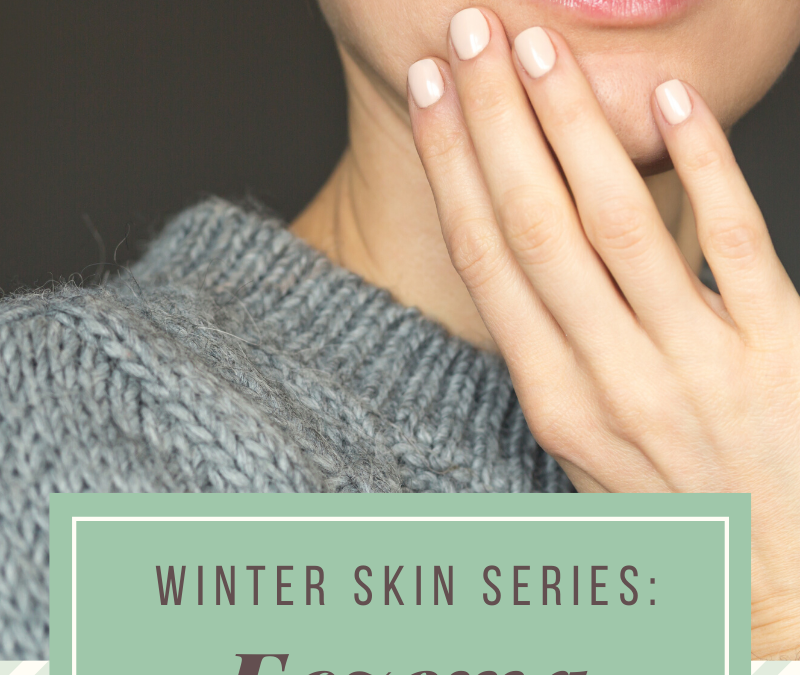Eczema flare-ups are uncomfortable and miserable experiences. And, it’s the time of year where inflammatory skin conditions are more common. This is usually caused by seasonal changes, increased exposure to irritants, and elevated stress levels. But, fear not because I am here to share some of my tried and true tips and tricks that can help with managing eczema during the winter months.

Page Contents
First Do You Know What Eczema Is?
If not let me provide you with a quick definition. Eczema is an inflammatory skin condition in which a dry, thick, scaly rash appears. It’s most commonly found on the face, wrists, hands, back of knees and feet but can appear anywhere. Additionally, eczema affects 10-20% of infants and 5% of adults. The exact cause of eczema is unknown, it’s believed to be linked to an immune system reaction. Consequently, this reaction is triggered by an irritant, an allergy, or low-grade inflammation present in the body. Common triggers that contribute to an eczema flare-up are an allergic reaction, seasonal changes, use of irritating products or substances, and increased stress.
Can An Eczema Flare-Up Be Prevented?
Yes, it can! Taking the time to understand what your unique triggers are as it relates to eczema and making modifications can help prevent flare-ups. The two ways you can work to prevent eczema include switching to winter skincare products and making small lifestyle changes.

Winterize Your Skin Care Products
I’m sure you’ve noticed how dry conditions affect your skin and how it feels. You probably feel your skin becomes drier and harder to keep moisturized. This is why switching up the products you’re using and changing your skincare routine with the season is important. Begin by transitioning to products that are safe for eczema-prone skin. This includes cleansers, moisturizers, and creams. Stay away from irritating ingredients such as fragrance, and essential oils. Additional irritating ingredients to look out for are parabens, phthalates, sulfates, and quaternium-15. These ingredients may contribute to eczema flare-ups.
Furthermore, opt to choose products that are approved by the National Eczema Association. Products approved by the NEA will have their seal on the product. Also, their website provides a list of approved products to help in your search. I will provide the link below in the references section.
Lifestyle Changes for Skin Health
In addition to creating a winter skincare routine that contains eczema friendly products, there are little habits that can benefit your skin. For starters avoid super hot showers and baths. These only dry out your skin which can increase irritation. Instead, opt to take lukewarm baths and showers and apply an emollient moisturizer afterward to replenish and seal in moisture. Also, as the weather gets colder and temperatures get lower you’ll need to provide extra protection for your skin. Applying an occlusive barrier before you spend long periods of time outside in cold, dry climates can help to prevent moisture loss by trapping it within the skin barrier.
Another tip is to avoid scratchy, itchy material that is irritating to your skin. Common fabrics that trigger a reaction include wool and some knits. If you want to wear these types of clothing make sure you have a barrier of clothing underneath to protect your skin. Also, when washing your clothes choose to use detergents and fabric softeners that are fragrance-free and gentle for eczema skin. When you’re cleaning around the home wear gloves to protect your hands from the household cleaners you use. Furthermore, since you’re probably washing your hands more frequently (hello, cold and flu season) keep a hand cream close by to re-moisturize and hydrate. And lastly, investing in a humidifier will help prevent your skin from becoming overly dry due to the climate and the use of central heat in the home.
What Can You Do to Treat An Eczema Flare-Up?
Sometimes no matter how diligent you are with preventative tactics you might still experience a flare-up. Knowing how to properly treat and address your flare-up can help to decrease its severity and prevent infection.

Protect & Moisturize
The first thing you’ll want to do is to make sure that you are properly moisturizing your skin and protecting it as much as you possibly can. Use emollient-rich creams and follow up with an occlusive ointment such as Aquaphor. This helps to rehydrate the skin barrier, and lock in much-needed moisture.
Treat the Itching
As you know scratching an eczema breakout is the worst thing that you can do. Not only does it increase the risk of infection but it may also cause it to spread and that’s no good. Instead of scratching use ointments, creams and lotions that help to combat the itch. Good options to try are Caladryl lotion, and hydrocortisone cream 1%. Another helpful option is to take an oral antihistamine such as Benadryl. This can help with decreasing the body’s inflammatory response and giving you some much-needed relief. Lastly, you may find that taking a warm bath with colloidal oatmeal to be helpful at easing and soothing the itch.
Eliminate Triggers
You will definitely want to make sure you’re cutting out all the things that may further irritate you. It may be beneficial for you to evaluate your nutrition and assess if there are foods contributing to your eczema flare-ups. Common foods that are known to aggravate eczema are:
- Citrus
- Dairy
- Eggs
- Gluten/wheat
- Soy
- Vanilla, clove, cinnamon
- Tomatoes
- Some nuts
Scheduling an appointment with your doctor to perform allergy testing and explore the possibility of an elimination diet may prove beneficial for long-term management. Additionally, stress may be a trigger for your eczema. If this is the case, learning proper stress management techniques can help to decrease cortisol and protect your body from an inflammatory response.
Share Your Tips!
These are all the tips and tricks I have used and currently use to help with preventing eczema flare-ups in the winter. And, for the past two years, I’ve been quite successful and haven’t experienced a serious flare-up. I think I had perhaps one minor flare last year but I was able to resolve it pretty quickly. But I’m curious to know if you have any tips on how to manage eczema during the cold, winter months? Do you have any unique struggles due to the climate you live in? I want to know all the details. Spill them in the comments below.
References.
(1). WebMD: Skin Conditions and Eczema
(3). National Eczema Association
About the Author.
 Hi, my name is Kathleen but you can call me Kat. I’m a health and wellness professional turned freelance writer and content creator. My personal struggle with infertility, endometriosis and ovarian cysts made me realize that there just isn’t enough information out there available to women to help them learn more about PCOS, endometriosis, adenomyosis, or fibroids. Basically there’s a serious lack of information concerning a variety of women’s health topics and issues and well I got fed up. I decided to be the change and created this blog in an effort to spread awareness and advocate for women’s health issues. It has now become my passion to educate and empower women to redefine their health and be their own advocate. You can find me on YouTube and Instagram. If you take the opportunity to visit me on my other platforms don’t hesitate to leave a message, I would love to hear from you!
Hi, my name is Kathleen but you can call me Kat. I’m a health and wellness professional turned freelance writer and content creator. My personal struggle with infertility, endometriosis and ovarian cysts made me realize that there just isn’t enough information out there available to women to help them learn more about PCOS, endometriosis, adenomyosis, or fibroids. Basically there’s a serious lack of information concerning a variety of women’s health topics and issues and well I got fed up. I decided to be the change and created this blog in an effort to spread awareness and advocate for women’s health issues. It has now become my passion to educate and empower women to redefine their health and be their own advocate. You can find me on YouTube and Instagram. If you take the opportunity to visit me on my other platforms don’t hesitate to leave a message, I would love to hear from you!
[gravityform id=”1″ title=”true” description=”true”]







Hey! I know this is kinda off topic however I’d figured I’d ask. Would you be interested in trading links or maybe guest writing a blog article or vice-versa? My website covers a lot of the same topics as yours and I think we could greatly benefit from each other. If you happen to be interested feel free to shoot me an e-mail. I look forward to hearing from you! Wonderful blog by the way!| а
Hi, for inquiries regarding guest-posts or to work with me please send a proposal with information regarding your company/blog/organization, an example of your work, and link to your site to inquiry@femmepowerhealth.com